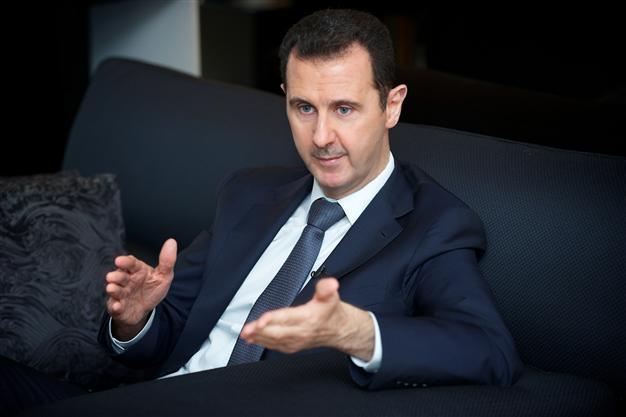Assad denies ordering chemical attack: CBS television
WASHINGTON - Agence France-Presse

AFP Photo
Syrian President Bashar al-Assad has denied he was behind a chemical attack last month and called on lawmakers to reject planned US military strikes warning of possible retaliation, CBS television said Sunday.
"He denied that he had anything to do with the attack," CBS veteran correspondent Charlie Rose said, after earlier interviewing Assad in Damascus. "He denied that he knew there was a chemical attack, notwithstanding what has been said and notwithstanding the videotape. He said there's not enough evidence to make a conclusive judgment.
"The most important thing, as he says, is that 'there's no evidence that I used chemical weapons against my own people'," Rose said. Assad's rare interview with an American network is to be aired on CBS on Monday.
The United States has led the charge that Assad ordered a suspected chemical attack against the residents of a Damascus suburb on August 21, which Washington says killed some 1,400 people including about 400 children.
Graphic videos released on Saturday showed dozens of people, including children, writhing on the ground with convulsions, some apparently foaming at the mouth and vomiting as rescuers sought to help them.
But Assad challenged the US administration of President Barack Obama to provide the evidence as it seeks to build domestic and international support for military strikes against the Syrian regime for breaking international conventions with its alleged use of chemical weapons.
"He said that he did not necessarily know whether there was going to be a military strike. He said that they were obviously as prepared as they could be for a strike," Rose added, citing his interview with Assad.
The long-time Syrian leader also "had a message to the American people that it had not been a good experience for them to get involved in the Middle East in wars and conflicts," Rose said.
"The results had not been good and they should not get involved and that they should communicate to their Congress and to their leadership in Washington not to authorize a strike." Assad further "suggested that there would be, among people that are aligned with him, some kind of retaliation if a strike was made," Rose said.
Congress is due to begin full debate this week on whether to approve Obama's plans for limited military strikes on Syria aimed at degrading its chemical weapons ability when it returns from its summer break on Monday.
But there is a deep skepticism among a war-weary American public over a new American military engagement in the Middle East.
Assad had also appeared concerned that any military strike could help tip the balance in favor of the opposition, speaking about "the lessons that he learned from his father, that war was ruthless," Rose added.
The veteran correspondent added it was clear that Damascus is closely watching the intense debate in the United States.
Pentagon officials were meanwhile readying more intense and longer attacks on Syria than originally planned, the Los Angeles Times reported Sunday.
War planners now aim to unleash a heavy barrage of missile strikes to be followed swiftly by additional attacks on targets that may have been missed or remain standing after the initial launch, the Times cited officials as saying.
The scale and purpose of the operation against Syria has not changed in recent weeks, although US forces would adjust as needed, a defense official however told AFP.
"We will continue to review our targeting and targeting options as the Syrian government adapts over time," said the official, asking not to be named.
Meanwhile, a top White House official said the Obama administration was "planning for every contingency" if the strikes do go ahead as "there's obviously risk of reaction and retaliation against our friends." "We have to obviously be very careful and very targeted and very limited in our engagement so we do not get dragged into the middle of this," White House chief of staff Denis McDonough told CNN.
